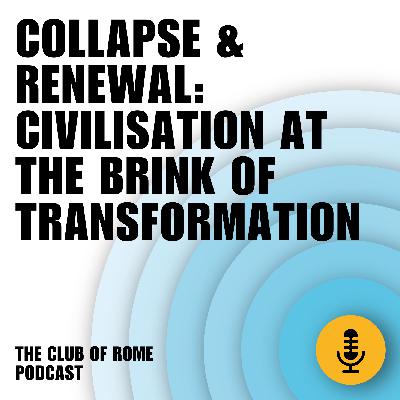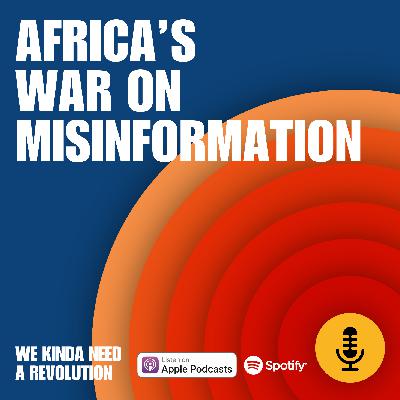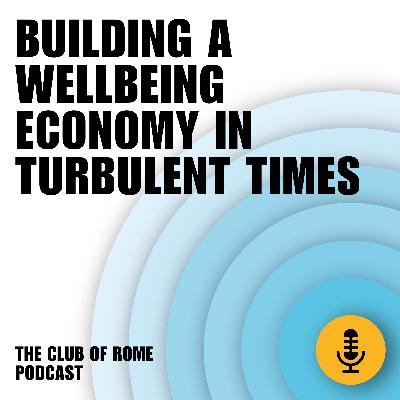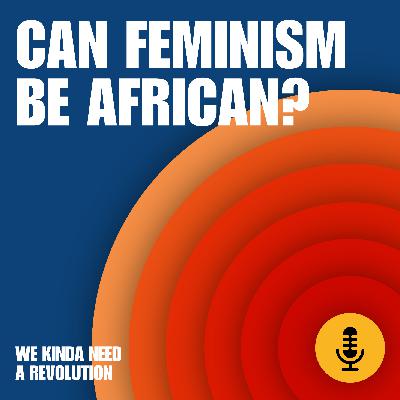Music, film and authenticity for social change with Sishii and Nolita Mvunelo
Description
Music, art, and media have always played powerful roles in social movements that created long-lasting societal change. Will the 21st century be any different? How can we inspire a generation to liberate their future actively?
In this episode, Nolita Mvunelo is joined by Sishii, an award-winning singer and activist. Together, they dive into the role of art and music in inspiring young Africans to make a difference in the face of adversity. They question why more artists do not address the climate change crisis and other systemic issues while reflecting on the importance of art in raising awareness, inspiring action, and shaping the future.
Watch the video:
Full Transcript:
Nolita: We kind of need a revolution. Welcome to a special edition of The Club of Rome podcast exploring how we can work together across generations, across continents, across contexts, to mobilize action for a regenerative future. I am Nolita Mvnelo, Programme Manager of the Club of Rome, and in this episode, I had a conversation with someone I am proud to call a friend, Sishii. Actor, R&B, singer heard by millions, based in South Africa and changing the world. Against a backdrop of all the concerns we are facing, we discussed the role of art and music in inspiring young Africans to make a difference in the face of adversity. Thank you so much for joining me and joining me in my world of big picture and asking big questions and asking about the future of humanity and society, but also the future of us as Africans. Other people won't know this, but you're partly responsible for why we're doing this limited series, because you're the one who said, "Yo, you we always have these interesting conversations. Why don't we, why don't you sit down and try to have more conversations with more interesting people?" So I'm very grateful for you taking the time to chat with me today.
Sishii: Thank you for having me and thanks for doing it.
Nolita: I have, like, a handful of questions that also, again, are very reminiscent of some of the conversations we've had. The first one being, we always share a sense of, like, these concerns about the future of South Africa, the future of Africa, and our place in making a difference in those concerns.
Sishii: Yeah. I mean, a lot of the time the conversation is about leadership. It's about what we as young people are doing currently for, you know, our country, our continent, our world, and what we're trying to do to make things better for this world. And I'd say that the concern, it's like, there's so many facets of life, obviously, there's the economy, there's politics. I'm an artist, so there's the future of the arts. And we kind of cover a lot of those subjects, you know, in the conversations that we have, but I think in all of those subjects, the primary concern is what we're doing to make things better, because we recognize that something is, something's definitely wrong.
Nolita: When you say what we're doing, do you feel like there is enough opportunity to do things?
Sishii: I think a lot of our conversation is about how we feel like those who do have the opportunity to do something aren't actually doing anything, and those who don't have the opportunity to do anything are not even really considering what possible changes there could be. And in terms of what I'm doing, I'm just doing what I love, which is being an artist and inspiring other artists. Inspiring, you know, young people, according to them, also, this is not, I'm not saying I'm an inspiration. I have been called one on a few occasions. Yeah, inspiring African artists to pursue their dreams of being artists and inspiring Africans in my little corner of the world, which is South Africa, to just believe in themselves, to believe that they can come from circumstances that aren't necessarily great and make a change in the world and try and do positive in the world. So yeah, I think that's what I'm currently up to, and I hope I'm doing well at it.
Nolita: Do you think you have a sense of what does it take to inspire someone who feels that they don't have enough opportunity to rise to leadership or to make like, like groundbreaking, world changing art.
Sishii: It's weird, but like, as an artist, it's when your intention is to inspire, and you create from wanting a certain reaction, right from certain people, it doesn't really work as well as when you're being true to yourself, it doesn't work as well as telling your story in the best way you know how with whatever it is that you have and so what I've learned is this road for me, has just been about storytelling and using whatever resources I can find, gather people. This is a people's business, yeah, just essentially using all of that to tell my story. And in the process, I found that there are people who find that inspiring. Because if you have gone through hardship and you're talking about it, I'm pretty sure there's someone out there, at least one, I mean, there's billions of people in the world, and surely there's one, if you just stay true to who you are. So that's been my journey of what I've been trying to do, and I've found that I've inspired people in the process. But I didn't kind of start my journey saying, oh, I want to inspire people. I just wanted to express myself. And I found that a lot of people just want to express themselves, and they really struggle to do so.
Nolita:I think you've hit, like, a very important point on authenticity. Because, like, as I started a conversation, I said, welcome to my world, this, podcast. But also a lot of the things that the Club of Rome and the international contract are working on are very much concerned about the question of leadership, but leadership, specifically when it comes to climate change and sustainability and the types of decisions that people are making. You make a point about storytelling and also authenticity being important for how to bring forth that messaging and that voice, but very often, I feel that it doesn't land. But from your perspective, when it comes to like, the concerns about climate and the risks that we're facing, do you feel that it's being, the storytelling is being effective, and if you do what is effective about it? If you feel that it's not being effective, what do you think could be done to improve it, from your perspective as an artist?
Sishii: So, I've not found a lot of artists talking about climate change, it's interesting. I don't think we take it as seriously as it is. I really don't. And as a result of that, I don't see much art talking about that, and I don't see a lot of people my age talking about climate change or even really thinking about it. There are people who think it's a lie, there are people who think, and a lot of the time, you ask those people why they think it's a lie, they go, "Ah, it doesn't make sense". "Well have you read anything about it?" It's like, "No, I haven't actually read anything about it. I just, I just think it's a lie." So there's this weird kind of choosing of sides without having any information on which side you're choosing, but saying, okay, it seems like there's a side I have to choose, so I'm just going to choose the side without actually figuring out why I'm choosing said side. Yeah, I don't know if that answers your question.
Nolita:Actually, I feel like, as you're speaking, in my mind, I immediately thought, imagine a song about climate and like, a song about climate and like, would it hit like, the Spotify 1 million streams or Apple Music, you know, like, would it? Would it hit?
Sishii: I mean, the only person I can think of who ever did stuff like that was like, Michael Jackson.
Nolita: Oh yeah, heal the world or something.
Sishii: Yeah I mean, this is my kind of perspective on life in general right now, which is that I think we have become a lot more self-absorbed, not necessarily in a negative way, but a lot of the time it does show up negatively. And that when it comes to a change that inspires or affects more people than yourself, you know, or more people that do not actually include yourself, you know, we're not finding people not being interested in doing that anymore.
Nolita: When I imagine like a challenge that's as big as climate, right, which requires collaboration on such a broad level, but also requires collaboration across different cultures and perspectives. One of the best ways to share values and perspectives in culture is in our art, right? So the role of art in making sure that everyone is involved in this big group project is incredibly significant. But for some reason, we are struggling to imagine that we could get a million Spotify streams on a song about climate. So how do we make it, yeah, so how do we make it happen?
Sishii: Right?
Nolita: Is there something about maybe it's where from, where we understand the innovation comes from. Like, not to quote him, but we know who said, listen to the kids bro. And he was making a very specific point about the tastemakers are young people. In your creative process, is there any like consultation that you do about like with the people who listen to your music and care about your music? Do you ever try to get a sense of like, this is what is interesting. These are the topics people are listening to. Or is it very much like me and my creative process.
Sishii: I would love to say absolutely not. I would love to be an artist who's so, you know, self-sufficient that people's opinions don't actually matter to me. I do subconsciously, I definitely subconsciously digest what people are thinking about and talking about, and sometimes it does affect my music. I'm trying to make that less of a thing, now. I think I'm doing better at that, but it's really hard. I think the kind of thing about being an artist is like, you've really got to be se
























